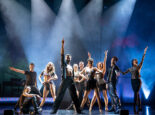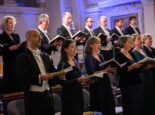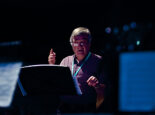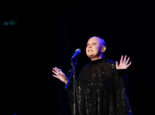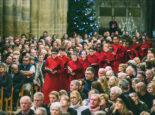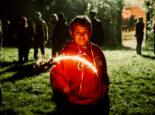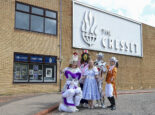Mimi and the Mountain Dragon
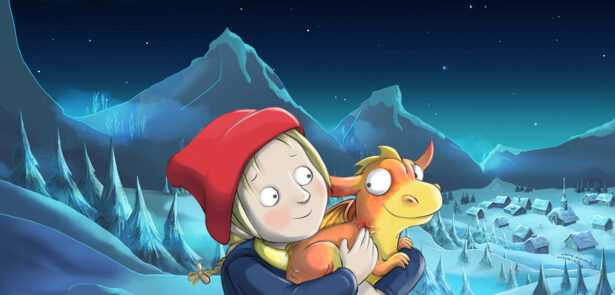
On 28 November, as partof a festive concert featuring family music favourites, Peterborough Youth Orchestra, young singers and professional musicians from across the city will be performing Rachel Portman’s epic score tothe animated adaptation of Michael Morpurgo’s much-loved children’s book. The story follows a shy little girl named Mimi, who finds a baby dragon and undertakes a perilous journey to return it to its mother – and save her community. The concert, presented by Peterborough Music Hub will include a full screening of the film to accompany the live music, with narrator and BSL interpreter. The Moment talked to renowned composer Rachel Portman OBE about the project.
How did the animated film originally come about?
Well, I know Michael Morpurgo and we’ve worked together a few times. And I feel like what I do musically is the equivalent of what he does – I tell stories with music. One of the few records my family had when I was growing up was Peter and the Wolf. It was a really important introduction to classical music for me as a child – the themes and the whole story told through the music – and I think it had a huge effect on me. I’ve always been really interested to do the same, to write a similar kind of thing. Michael and I are always looking to find projects that we could do together, and he came to me – as he often does – with this story of Mimi and the Dragon and said ‘You know, I think this could be one of those projects…’ And so that’s how it started. But then we had to figure out how to tell this story, musically. And we enlisted the help of another collaborator I’ve worked with, who’s also a friend of Michael’s, the great writer and poet Owen Sheers, who adapted the story literally beat by beat, helping to sort of flesh it out so it could be animated, pulling together animation and music. That was based on this beautiful book by Michael, with drawings by Helen Stephens, and Michael was involved in it, but he’s the easiest, most generous collaborator you could imagine. And, creatively, it came together with us three on one side, and then the animators on the other side. But it really started with my great desire to do something like Peter and the Wolf and wanting to work with Michael.
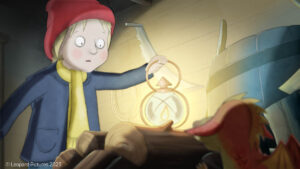 It’s a story about music, of course, and the power of music to bring people together. That must be a gift for a composer?
It’s a story about music, of course, and the power of music to bring people together. That must be a gift for a composer?
If you look at what Michael does with a lot of his live performances where he tells stories, he has musicians playing. So he’s very plugged into music and musical storytelling. His stories are always really fun, but there’s also real humanity to his writing, and they’ve always moved me. And they often have a very important message, in the same way that, you know, I was drawn to do an opera of The Little Prince, which is a book ostensibly for children, but it’s got very important philosophical ideas for grownups as well. The same thing is true in Michael Morpurgo’s work, which gives it a sort of resonance and address. This story is all about inclusion and listening to others. It couldn’t be more relevant to today and what’s happening in the world right now.
You’ve written over 100 scores for film, TV and theatre and worked with some incredible directors, including Alan Parker, Jonathan Demme, Lynne Ramsay, Robert Redford, Mike Leigh, Diablo Cody and Roman Polanski. I imagine that process is often quite prescriptive – were you more free with this?
I had so much freedom in this project. It was fantastic. I got an animatic of it, which is a sort of stop-frame, drawn animation to give the structure and timing. And I wrote the whole thing to that, with reference to a very detailed storyline script, from Michael and Owen Sheers, and then the final animation was done to my music.
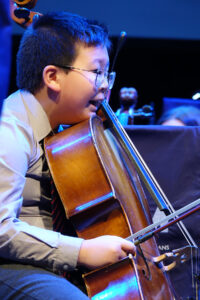 How do you begin when it comes to musical ideas?
How do you begin when it comes to musical ideas?
I don’t think too much, actually, I just sort of get into the mood of it, and then ideas come. So it’s more instinctive. I’m thinking ‘How would I tell this story?’ and then music comes to me. Perhaps there’s a bit that needs to move on the storytelling, so I need to put some kind of momentum behind the scene to keep it going. And then of course, I’m thinking about my audience, which can be quite young in this case. So it’s got to be fun, and humorous and sweet and touching. And scary – but not too scary! You know, all those things. The thing that was really important to me was that I really didn’t want to write ‘an animated film score’ – you know, one that picks out and describes every action. I wanted this to have an arc with themes running all the way, so the music happens in proper sentences and chapters and it’s not just tailored to the individual minutiae of everything that’s going on. I wanted this to be a piece of music that can stand on its own – a much bigger thing. It’s like a different world that you can listen to on a record, where you’re thinking ‘Oh, I know what’s going on here…’ It makes me very happy that when my nieces listen to just the music, and they say ‘Oh, this is when that happens!’ So they’re making the connection with the drama but the music is telling the story. We could have had narration throughout it, rather than just at the very beginning and the very end, but we didn’t need it.
Mimi’s song is the very heart of the story, with so much resting on it. Did you approach that part with any trepidation?
I always have trepidation about anything that I’m doing but no, not for the song especially. I wrote the whole piece sequentially, which is not something I normally do on a film, but I knew I wanted to treat it like a classical commission that can be performed live as a piece, so by the time I got to Mimi’s song the direction felt clear – and of course there were the words that Owen wrote for it. These things sort of just happen. They’re organic, and it comes out of it. It’s like the score I’m working on now. I’ve been working on it for months and months, and by this time it’s a well-oiled machine. I know what to write here, I knew what to write there. The ideas flow. But for me, it’s because I’m connected to a story that I love.
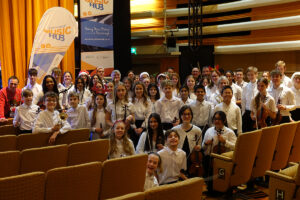 It’s a BIG score! Truly symphonic and cinematic. Is it going to be a challenge to perform?
It’s a BIG score! Truly symphonic and cinematic. Is it going to be a challenge to perform?
Yes, it is! But it’s so amazing that they are doing it. To me, that makes me almost happier than when we first did it – and that was so wonderful, when we recorded it with the children. We had little girls singing and the Halle Children’s Chorus sang, and then the grown-up chorus as well. And it was just wonderful – so moving – when they did it. But to perform it live, with the film, is incredible.
Do you have a message for the young people who are going to be performing it?
I’m just thrilled that they’re playing it. I’m thrilled that they’ve learned the music and they’re going to perform Mimi and the Mountain Dragon in its full form to picture – to tell and play this really moving story about something that is actually so important and give it life. It’s a magnificent thing they’re doing. I have a feeling it’s going to be the most wonderful performance!
Peterborough Music Hub presents:
Mimi and the Mountain Dragon
Premiere with Live Orchestra Tuesday 28 November 2023
Peterborough Youth Orchestra & local professional musicians and soloists
Conductor: Robin Norman
Narrator: Donna Barnes
BSL Interpreter: Amy Casselden
6pm (run time approx. 1hr)
Tickets £8 (inc. booking fee) available at the box office or at
What’s On – New Theatre Peterborough newtheatre-peterborough.com









